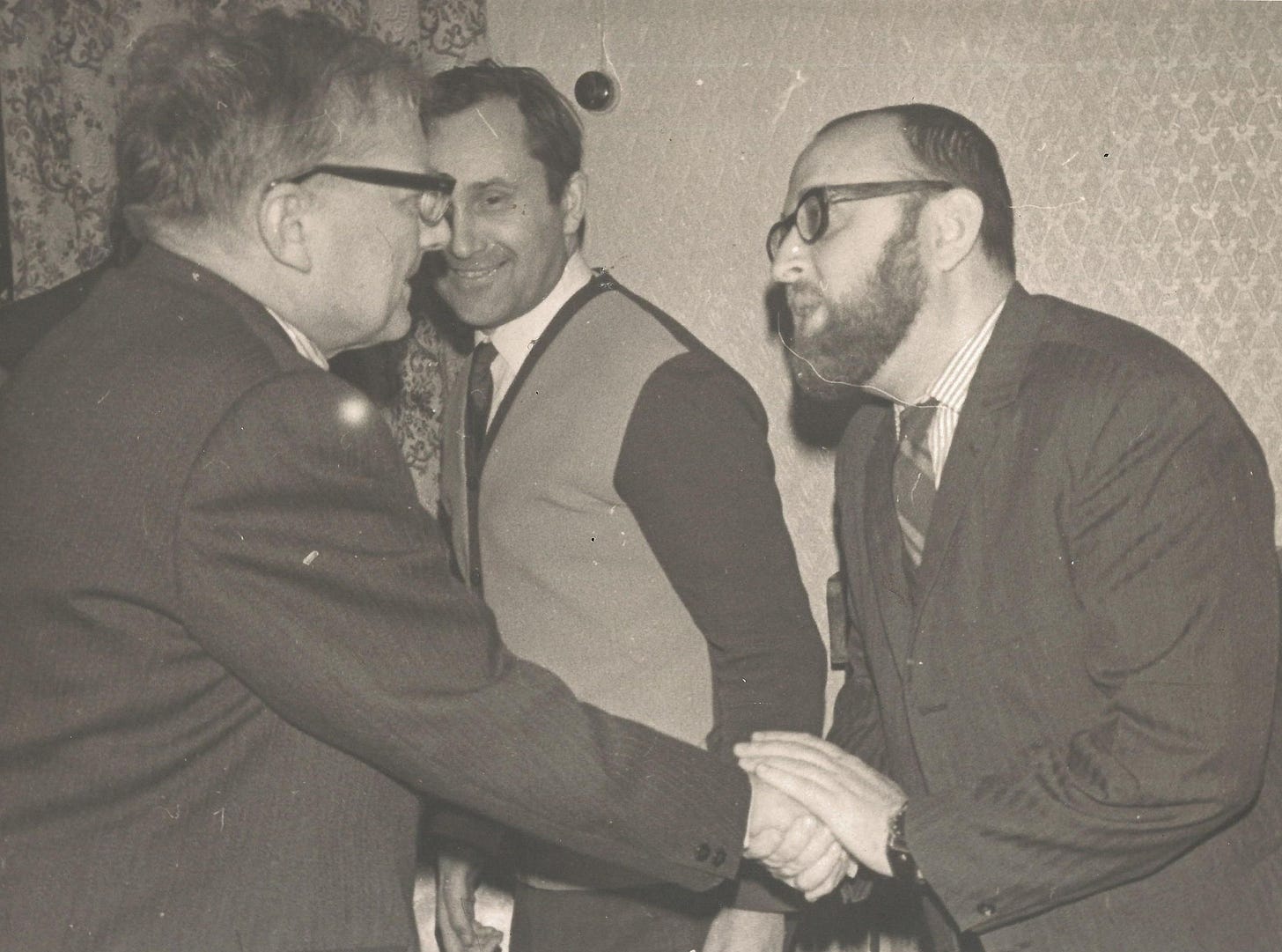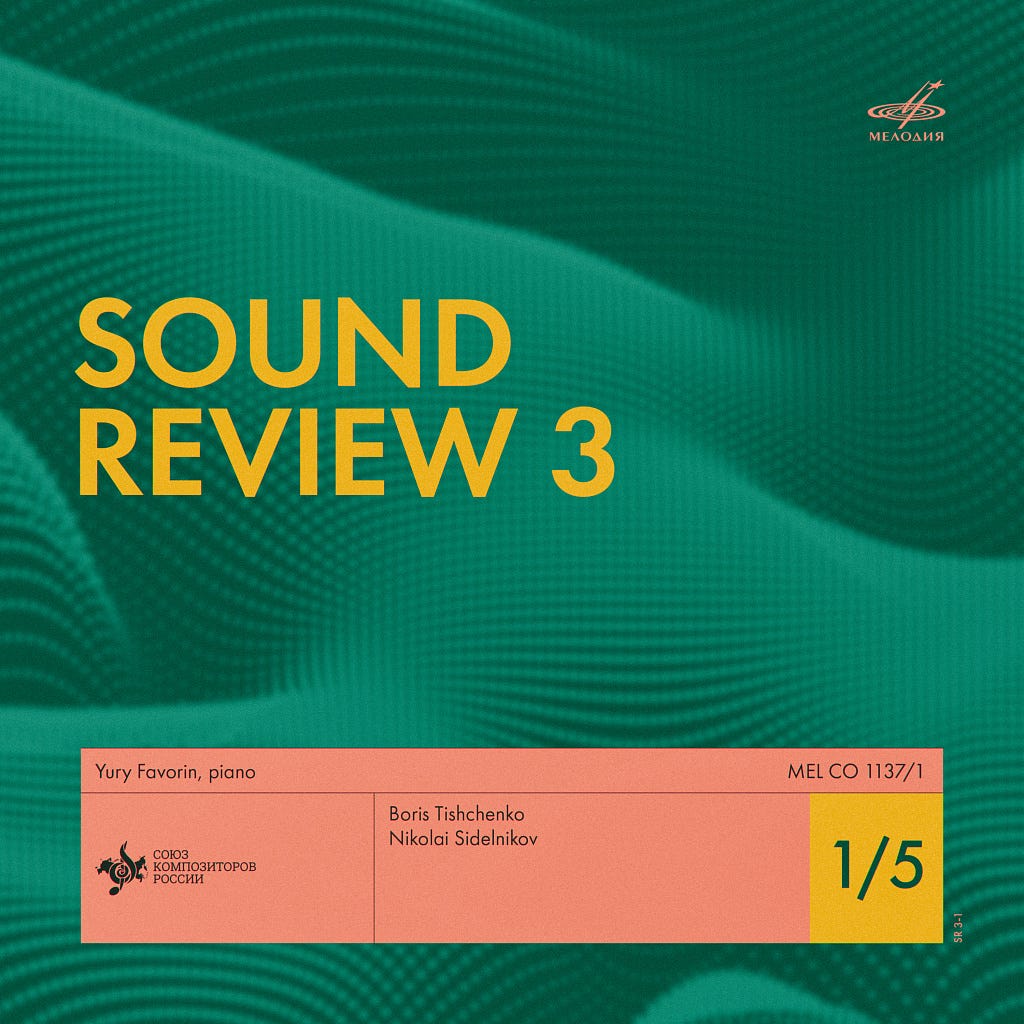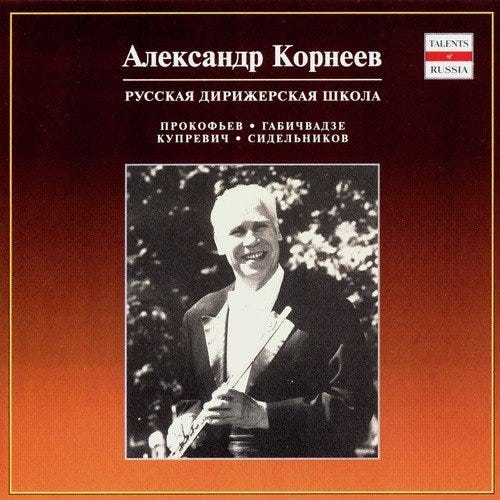Nikolai Sidelnikov's music deserves to be known
Giving a listen to one of the more obscure Russian composers
Nikolai Sidelnikov, right, shakes hands with Dimitri Shostakovich. (Photo from Sidelnikov website.)
As much as I love the famous Russian composers of the 20th century and the modern age — Stravinsky, Prokofiev, Shostakovich — I have a soft spot for the many more obscure composers who don’t get more attention.
I have lately been listening to Nikolai Sidelnikov (1930-1992). He is not only a virtual unknown in comparison to the composers mentioned above, he is also relatively little recorded in comparison to composers such as Edison Denisov and Sofia Gubaidulina. In the last few years, he has enjoyed a very modest revival, with a couple of recordings issued to people who want to sample his music.
I discovered Sidelnikov when I bought Yuri Favorin’s Sound Review 3 1/5 album, mainly because Favorin is my favorite piano player, and I figured any Russian composer Favorin bothered to record had to be pretty good. The album pairs Boris Tishchenko’s fifth piano sonata with a collection of Sidelnikov’s What the Finch Sang About, 25 short piano pieces written for children. It’s a rather unusual bit of programming, as Tishchenko’s piece is rather “out there” for many listeners, while the Sidelnikov is very melodic and hearkens back to much older works.
So they don’t really fit together stylistically, but as it happens, I loved both pieces, and tried to promote the album in this newsletter. I have become obsessed with Tishchenko, whom I hope to write about soon, but I also fell pretty hard for Finch. The Melodiya record label’s page for the album lets you download the album notes and also has links to the music services where you can stream or buy the album.
Sidelnikov’s Russian Fairy Tales, which dates to 1968, is his best-known work and has a more modern sound than What the Finch Sang About. But I don’t know what the typical Sidelnikov sound would be, because as I detail below, it’s difficult to get a decent sample size.
The Wikipedia article on Sidelnikov is pretty short, although it covers the bases. But somebody–or-other — and I’d give credit if I knew — has put together a wonderful tribute website that’s all about Sidelnikov’s career, in both Russian and English.
The website has an excellent essay on the home page explaining Sidelnikov’s music, a long biography, a big gallery of photographs, a bibliography with links to many pieces available online, and a section where you can listen to performances of much of Sidelnikov’s work, which is pretty handy, as much of it apparently remains unrecorded.
The only information the website lacks is a discography of commercial recordings.
I’ve only been able to track down and acquire three albums so far that have a decent amount of Sidelnikov’s music; there are apparently a few other albums that have only one very short Sidelnikov piece.
The trio of albums I’ve found so far are the Yury Favorin album mentioned above, and two more that I’m describing for you here.
Moscow Conservatory Records has issued the only album I can find that consists entirely of Sidelnikov’s music: A recording of the Russian Fairy Tales paired with Duels, a chamber symphony. The performers are the Studio for New Music Ensemble, and as the recording isn’t easy to find, I’m going to link to Amazon, where I was able to buy it. Even Presto Music doesn’t carry it. I’ve really enjoyed the recording. It apparently was issued in 2022 and good for Moscow Conservatory Records for putting it out.
The only other recording in my slim Nicolai Sidelnikov library is Russian Conducting School. Alexander Korneev, which also has a recording of Russian Fairy Tales. There are also pieces by two other relatively unknown Russian composers, Revaz Gabichvadze and Viktor Kuprevich, also worth listening to. Sergei Prokofiev is on the album, too, but you likely won’t know the piece, the bright and cheerful American Overture. Honestly, this is an album well worth listening to.
Russian Fairy Tales received its American premiere in 1989, in New York City. Sidelnikov even got a paragraph in the New York Times, written by Allan Kozinn:
“Nikolai Sidelnikov's ‘'Russian Tales' (1969) had its American premiere. In its text, read in English by Robert Sherman, a few ancient fables are wrapped into a paean to the mystical powers of the Russian landscape. Its music is varied and generally atmospheric, despite incongruous moments - the skillfully arranged jazz section, for instance, which inexplicably follows a text section about an ancient king.”
A couple of photographs at the Sidelnikov website depict the composer in New York City, and one of the pieces that can be streamed at the website is a collection of 13 etudes, America! It Is My Love. Perhaps we can infer Sidelnikov enjoyed his visit to the United States?
If you search YouTube, you can find some other pieces. And it would be cool if a few programmers at classical music stations would discover Sidelnikov and give him some exposure on the air.








Thank you for sharing this. I don't know this music. I have really enjoyed listening to Stravinsky symphonies over the past few months.